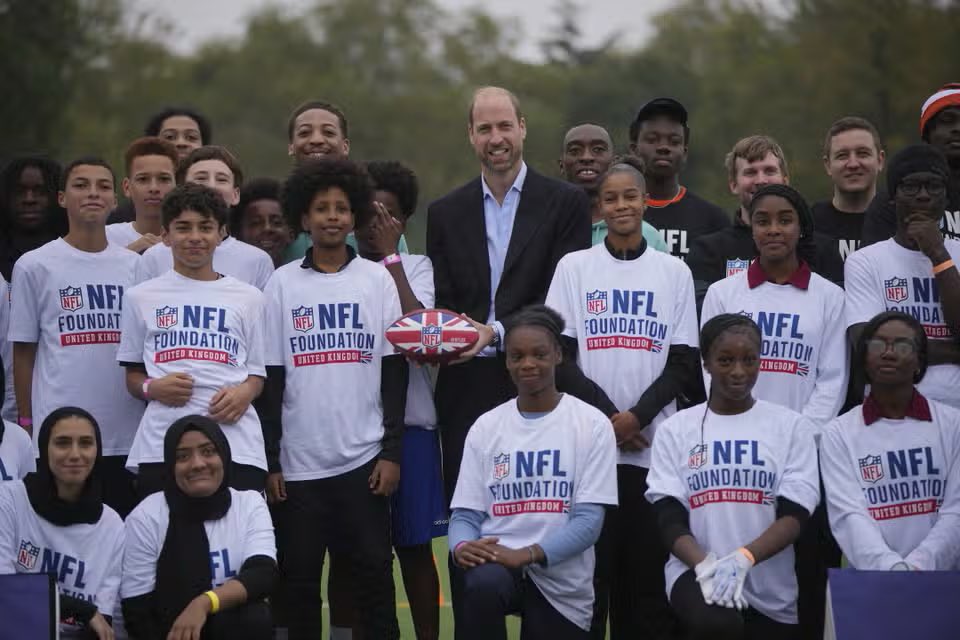SEN & Disabilities
This page contains information on the academy’s provision for students with special educational needs or disabilities.
SEN contact details
Our SENDCO is Katie Beard, k.beard@harrislowewillesden.org.uk, tel 0208 838 8758.
Associate Principal for SEN is Ben Pittaway, b.pittaway@harrislowewillesden.org.uk.
Click HERE for full details of Brent's Local Offer.
How we support young people with special educational needs or disabilities
At Harris Lowe Academy Willesden we work to ensure all students with special educational needs and or disabilities receive the support they need to make exceptional progress and prepare effectively for adulthood.
We uphold high standards of achievement, provide opportunities for all to succeed and encourage in our students a set of personal values based on honesty, trust, tolerance and respect for others. We are fully committed to meeting the needs of those pupils with special educational needs and disability so far as is reasonably practicable and compatible with the provision of the efficient education of other pupils. In meeting these responsibilities, Harris Lowe Academy Willesden has due regard to the SEND Code of Practice (April 2020), the Equality Act (2010) and Part 3 of the Children and Families Act (2014).
We work collaboratively with parents/carers and students to ensure they are at the forefront of decision making regarding their/ their child’s educational needs.
How we know if a young person has special educational needs
Students have special educational needs if they have a difficulty which calls for special education provision to be made for them (e.g. which is in addition to or different from areas differentiated within curriculum plans). Harris Lowe Academy Willesden regards students as having a SEN/D if they:
-
Have a significantly greater difficulty in learning than the majority of students of the same age; or
-
Have a disability which prevents or hinders students from making use of educational facilities of a kind generally provided for students/young people of the same age in schools within the area served by the local authority.
Students must not be regarded as having a learning difficulty solely because the language or form of language of the student’s home is different from the language in which they will be taught or because they have received poor teaching which has hindered progress.
How we know if a young person has special educational needs
Students have special educational needs if they have a difficulty which calls for special education provision to be made for them (e.g. which is in addition to or different from areas differentiated within curriculum plans). Harris Lowe Academy Willesden regards students as having a SEN/D if they:
-
Have a significantly greater difficulty in learning than the majority of students of the same age; or
-
Have a disability which prevents or hinders students from making use of educational facilities of a kind generally provided for students/young people of the same age in schools within the area served by the local authority.
Students must not be regarded as having a learning difficulty solely because the language or form of language of the student’s home is different from the language in which they will be taught or because they have received poor teaching which has hindered progress.
Identification
- Identified through teacher observations and assessment
- Baseline and standardised assessments SATS, LASS and NGRT (literacy assessments)
- Termly data collection
- Parental / guardian concerns
- The student's own observations
- External agencies (Speech and Language/Educational Psychologist/Occupational Therapy/CAMHS/WEST/West London Zone)
- Parents are kept informed at all time by letters and meetings
What we do to help young people with special educational needs
Our staff pride themselves on providing high Quality First Teaching, which includes differentiation, effective feedback and marking and ensuring that pupils’ needs are met within the classroom. Subject teachers are responsible for all the pupils they teach.
- For those pupils identified as needing additional support, a Learning Support Assistant (LSA) support may be provided in lessons.
- Small group and 1-1 support is provided by our SEND Team in our SEND Classroom ‘Aspire’ for students experiencing difficulties in literacy and numeracy.
- Support for small groups and individuals who experience difficulties with social, emotional and/or mental health (including behaviour) is also provided in Aspire Classroom by members of the SEND Team and, where appropriate, external agencies such as United Borders and the SMILE-ing Boys programme.
- Pupils will be supported to catch up with their peers through intervention support. Interventions are time-limited, with clear entry and exit criteria.
- Pupils with more complex special educational needs will receive on-going and targeted intervention from the SEND team.
- Provision mapping gives an overview of the additional interventions that the school provides. Interventions are carefully selected to meet the needs of the pupils and monitored by the SEND team.
- Governors play an active role in strategically monitoring the quality of our Special Education Needs and Disability provision. Our link SEND governor meets regularly with the SENCO to discuss the provision for students with SEND.
- Pupils’ targets are monitored and reviewed termly and Annual Review of Education Health and Care Plans are coordinated and convened by the SEND department.
- At Harris Lowe Academy Willesden we have a large number of students with communication and interaction difficulties. We have an on-site Speech and Languages Therapist and our SENDCO and Learning Support Assistants are Elklan trained.
- Social skills, career and life skills sessions are also provided.
- There is a large counselling and therapy service based at the academy.
- We offer a range of extra-curricular activities, which can be found in our clubs and classes section.
How we adapt teaching for young people with special educational needs
We adapt teaching for young people with Special Educational Needs through the following ways.
- We offer a broad and balanced curriculum.
- Teachers use information from SEND Pen Profiles and targets to differentiate for students.
- Setting and smaller groups are used where appropriate to meet students’ needs. In English and Maths additional teachers are employed to ensure smaller class sizes.
- The quality of teaching of SEND students is regularly assessed and monitored to ensure it is meeting students’ needs.
- For those with complex needs a differentiated literacy and numeracy curriculum is taught and gaps in learning are supplemented with extra support from the SEND Team in our SEND Aspire Classroom.
- Regular training is provided to support teachers and LSAs in meeting the needs of SEND students.
- Additional support from Learning Support Assistants is deployed.
How we decide what resources we can give to a young person with special educational needs
When a student is identified as having special educational needs a SEND Pen Profile is created.
The Pen Profile informs us about the student’s areas of strength and weakness, how they can be supported in lessons and around school and includes the student’s commitments to self-help. For students with an ECHP, resources are deployed based on the aims of their individual plan and reviewed in annual review meetings.
The budget is deployed to meet the needs of the students in accordance with the provision map and evaluation of the effectiveness of interventions.
How we check that a young person is making progress and how we keep parents informed
Assessment, planning and review
Identification and assessment
Students with SEND may be identified through teacher observations and assessment, standardised assessments, progress checklists, target setting, parental / guardian concerns or the students’ own observations or by external agencies. Areas of need are identified and prioritised and become the basis of the Pen Profile.
Planning and doing
Pen Profiles inform teachers and staff about the student’s areas of strength and weakness and how to best support the student in lessons and around school. They also include information about:
- The young person's needs
- The young person's aspirations
- The teaching strategies to be used
- The provision to be put in place
Interventions are carried out, based on identified needs: these are usually based around gaps in the student’s literacy and numeracy education, social communication and/or interaction, emotional regulation, actions and responses, subject-related coursework and/or physical difficulties.
Wave 1 interventions (in lessons) and Wave 2 interventions (within departments) remain the responsibility of the subject teachers and individual departments. Wave 3 interventions are the responsibility of the SEND Team.
Review process
Pen Profiles are reviewed termly, with input from the student, parent/ guardian, teachers, Learning Support Assistants and/or relevant external agencies.
At the end of each intervention, a student’s progress is reviewed.
All EHCPs are reviewed annually in school. Parents / guardians, the student, Learning Support Assistant/s and other involved professionals will be invited to consider the progress made by the student and whether any amendments need to be made to the EHCP. Students participate in their Annual Reviews by:
- Attending their review meetings
- Offering their opinion and advice in the setting of targets
- Discussing their achievements / concerns / issues in advance of the review meeting with parents / guardians or others as appropriate.
Student voice
Students with an EHCP are invited to their annual review meeting and supported to share their views regarding achievements, concerns and wishes. Students are encouraged to contribute to the setting of their own targets and strategies.
Support we offer for young people's emotional, social and general wellbeing
We support young people with their emotional, social and general wellbeing needs through, for example:
- a comprehensive PSHE curriculum covering all aspects of SMSC, with in learning advisor and assemblies
- specialist mentors
- a counselling and psychology service based at the academy
- a variety of therapeutic services
- health care plans produced by the school’s welfare officer
- specialised support for students with SEND in our Aspire Class
Specialist external services we use
The specialist external services we use include:
- Educational psychologist
- Speech and Language Therapist
- Child Adolescent Mental Health Service (CAMHS)
- Occupational Therapist
- Brent Autism Outreach Services
- Brent Deaf and Hearing Impaired Service
- Brent Wellbeing and Emotional Support Team (WEST)
- United Borders
- SMILE-ing Boys mentor
- West London Zone
Staff training information
Staff training includes:
- individual teachers and teaching assistants training relevant to the needs of specific groups of pupils (e.g. Autism, Speech and Language needs, Dyslexia)
- five whole-school staff INSET and weekly staff and department meetings including department-focused SEND training sessions
- specialist Elklan Speech and Language training for SEND Department.
- induction on SEND for new staff throughout the year if needed
- training from SEND team with individual/small groups of teachers regarding specific student needs
Our school environment
Our accessibility plan is regularly reviewed and updated in consultation with the SENDCO, Brent Habilitation Team and in accordance with the 2010 Equality Act.
The school is a single site modern building with lift access.
How we involve young people in their education
- Frequent discussions with students regarding their Pen Profile and the support they receive in school
- Work reviews
- Whole academy policy: feedback from all students regarding their learning in every lesson (RAG123) which informs teacher planning
- Students attending EHCP annual review meetings
- Student feedback forms
How we involve young people in their education
- Frequent discussions with students regarding their Pen Profile and the support they receive in school
- Work reviews
- Whole academy policy: feedback from all students regarding their learning in every lesson (RAG123) which informs teacher planning
- Students attending EHCP annual review meetings
- Student Feedback forms
Our results
| Progress 8 | All | 0.42 |
| E | - | |
| K | 0.1 | |
| N | 0.3 |
| Average English Attainment 8 Grade | All | 5.1 |
| E | - | |
| K | 3.7 | |
| N | 5.2 |
| Average English Progress 8 | All | 0.2 |
| E | - | |
| K | 0.2 | |
| N | 0.2 |
| Average Maths Attainment 8 Grade | All | 4.7 |
| E | - | |
| K | 2.7 | |
| N | 5.0 |
| Average Maths Progress 8 | All | 0.5 |
| E | - | |
| K | -0.1 | |
| N | 0.6 |
How parents are involved in school life
Parents are encouraged to participate and engage in the life of the school. You are encouraged to discuss any concerns at the earliest opportunity. Communication with parents will consist of some of the ways listed below:
- Parents’ evenings
- Review meetings
- PSP meetings
- Annual reviews
- Meet the tutor evenings
- Phone calls
- Texts
- Letters
- Emails
- Information on the school website
- Governing body
- Multi-professional meetings
Contact details for support services
How we prepare for young people joining our school and leaving our school
Our open evening in the autumn term is an opportunity for SEND pupils and their parents to meet the different staff and departments in the school. Individual appointments can be made with the SENDCO for a tour of the school and gather relevant information.
- Attendance at annual review and other meetings at the primary schools by the SENDCO.
- Induction programmes in the summer term.
- Extra visits by SEND pupils.
- Summer school run by academy staff.
- Transition support from the learning mentors.
- Careers support and guidance from SEND Careers at key transition stages.
- In-school careers and guidance at key transition stages.
- Staff visits to the primary feeder schools.
Looked after children
Where a young person is looked after they will be assigned to a member of the safeguarding team by the Designated Safeguarding Lead. See our Safeguarding page for details.The role of this person is to liaise with the virtual school and children’s services, hold Personal Educational Plan (PEP) and Looked After Child (LAC) reviews.
Looked after children are assigned Pupil Premium funding which is used to support their education.
Where students have Special Educational Needs or Disabilities this information would be shared with the SENDCO and where relevant with teachers.





















